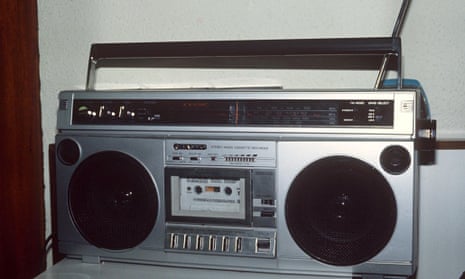Like many people, I still have the tapes: C60s and C90s, holding a clutter of favourite songs clumsily recorded off the radio: Robbie Nevil’s C’est La Vie, Cyndi Lauper’s True Colors, hits from Cutting Crew, Huey Lewis, Five Star, Terence Trent D’Arby. And always in among them the sudden bursts of the DJ’s voice, most of the time Bruno Brookes or Mark Goodier, butting in at the tail end of a song, or trampling all over its intro.
Times change, of course – there are now infinitely more sophisticated ways to acquire your favourite new songs than relying on a ghetto blaster and your own lightning reflexes as you listen to the singles chart rundown on a Sunday evening.
The singles chart itself has changed too – or at least the way it is devised has shifted: since last summer audio streaming has been included as well as physical sales. And the DJ’s voice is different too: Clara Amfo is at the helm of Radio 1’s Official Chart Show.
But a genuinely unsettling change was the news that soon the chart show may leave its hallowed early Sunday evening slot and relocate to Friday night.
It is not a ratings-grabbing move so much as a small helping of common sense. In the UK, new singles are released on a Sunday and new albums on a Monday. But now the International Federation of the Phonographic Industry (IFPI), which represents the music industry around the world, wants the release dates to move to Fridays, as in the rest of the world.
One can see the logic – music, and the way we consume, it has become globalised, and differing release dates leave the industry open to piracy. The IFPI also spoke of hoping to “breathe new life back into the release of music”, bringing a sense of grand occasion to the Friday night chart and the tide of global releases.
But we will lose something too. Since its beginnings, in October 1962, when it was named Pick of the Pops and broadcast by Alan Freeman, the official UK chart rundown has been a glorious Sunday tradition, a national cultural glue. In my family’s house we listened to it turned up loud, debated the surprise new entries, bet on the top five, groaned as one when the record on the top spot remained unbudged for yet another week (yes, I’m looking at you, Wet Wet Wet).
The grand traditions of Sundays have changed immeasurably over the past 30 years, of course: church attendance has fallen; few muster the necessary enthusiasm for a full roast dinner; and where once shops stood shuttered, now they are open for trade much as on any other day.
Sunday brings no sense of occasion, no taking stock of the week past and the days ahead. So perhaps the sense of vague rumination that the Top 40 Chart once used to carry is now redundant, perhaps the IFPI is right, and the singles rundown should be more about the grand spectacle, the global event of Friday night.
But I shall miss its steady burble, of a Sunday afternoon: one of those familiar and peculiarly British sounds, like Test Match Special or the steady roll of Antiques Roadshow. And instead I shall come to regard it as one of those musical landmarks of my youth — Top of the Pops, Smash Hits, Our Price — that progress thought best to bulldoze to make way for something faster, bigger, brighter.

